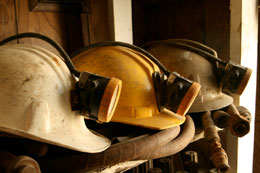Mine inquiry hears safety claims
 A coronial inquest has heard details of the day a man died in a mud rush at the Mount Lyell copper mine in Tasmania.
A coronial inquest has heard details of the day a man died in a mud rush at the Mount Lyell copper mine in Tasmania.
In recent sessions, a mine foreman denied calling a shift supervisor “soft” for raising safety concerns.
Anthony John Clark was foreman at the time of the incident that killed bogger operator Michael Welsh in January 2014.
Mine supervisor Leigh Johnstone had earlier addressed Coroner Simon Cooper and claimed that Mr Clark had called him “soft” and told him his crew was “walking all over” him when he raised safety concerns just hours before Mr Welsh died.
Mr Welsh was preparing a particular ore drawpoint for production - the same drawpoint that Mr Johnstone had raised concerns about with Mr Clark about on the day of the incident.
Mr Clark denied calling Mr Johnstone “soft”, but said he may have told him that the crew was “walking all over” him.
When the pair met to discuss the work that had been achieved in the previous nightshift, Mr Johnstone informed Mr Clark that he believed a particular transverse drive should have its risk level raised.
Mr Clark questioned the necessity of the reclassification, but ultimately deferred to Mr Johnstone’s judgment.
Mr Clark allegedly admonished Mr Johnstone for a lack of work achieved the previous night.
“I was crabby with the work the boys had achieved that night. Which wasn’t a lot,” Mr Clark told the inquest.
After the drive’s risk level was changed from ‘monitor’ to ‘medium’, Mr Clark discussed it with the day shift supervisor, David Woolley.
It was decided that Mr Welsh should go down to inspect the drawpoint with Mr Woolley.
“The two guys I sent down had the most experience at that mine site,” Mr Clark said.
“[Mr Welsh] trained all the bogger operators that were there.”
The inquest continues.
Earlier sessions had heard the use of harnesses was “encouraged” but not mandatory, and that a wooden platform on which workers were standing was tested with little more than a “wiggle test”.







 Print
Print